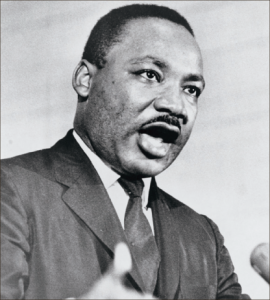Celebrating Black History Month

Just how much progress have we made in the 50 years since Martin Luther King Jr.’s inspirational speech?
It is hard to imagine that a little less than 50 years ago, our nation did not consider African Americans to be equal with whites. Their voting rights were discriminated against, public schools were segregated, and even drinking fountains were separated with signs for “white” and “colored” individuals.
Yet, this was the status quo for our country in the mid-twentieth century. Sadly, we committed some of the greatest injustices in the world in the greatest country in the world.
“I have a dream that my four children will one day live in a nation where they will not be judged by the color of their skin but by the content of their character,” Martin Luther King Jr. said in his epic 1963 speech at the Lincoln Memorial, challenging the racial inequalities of the time.
In the 50 years following King’s iconic speech, America has moved from a nation where racism was embedded in our laws to having an African American as president.
President Barack Obama, Tiger Woods and Oprah Winfrey are all examples of the many African Americans who have reached the peak of their respective careers.
“If there is anyone out there who still doubts that America is a place where all things are possible, who still wonders if the dream of our founders is alive in our time, who still questions the power of our democracy — tonight is your answer,” President Obama said after winning the 2008 presidential election.
Times most certainly have changed, but can we truly say that equality has been reached?
According to census.gov, as of 2010, 25.8 percent African Americans lived in poverty compared to only 12.3 percent of Caucasians.
According to a criminal justice facts sheet released by the NAACP, “African Americans now constitute nearly 1 million of the total 2.3 million incarcerated population. African Americans are incarcerated at nearly six times the rate of whites.”
It is clear that while it is possible for minorities to succeed, they do not do so at the same rate as Caucasians. Why is that?
One of the biggest arguments today about equality is the debate between the apparently opposing concepts of equality of opportunity and equality of outcome.
Equality of opportunity is the idea that everyone should have an equal chance to succeed. Equality of outcome is the belief that in a racially equal society, different races should have similar levels of success.
It is easy to say that everyone should simply have an equal opportunity to succeed, but if the outcomes are not equal, is there truly equal opportunity?
The answer to that is no. There is not equal opportunity, but that is not necessarily due to racism.
“One child is born blind, another with sight. One child has parents deeply concerned about his welfare who provide a background of culture and understanding. Another has dissolute, improvident parents,” Milton and Rose Friedman explain in their book Free to Choose. “They clearly do not have identical opportunities at birth, and there is no way that their opportunities can be made identical.”
As my Dad so often told me when I was growing up, “life isn’t fair.” The reality is that people are born into different situations, and those situations directly affect their chances of being able to succeed in life.
We will never truly achieve equal opportunity. It is not feasible to believe that everyone can be born into the same amount of success, quality of living and encouragement.
As human beings, we are equal in our rights, yet unique in our talents and abilities.
Instead of striving for an unachievable goal, what we should strive for is a society where someone who wants to succeed can be given the tools and instruction necessary for success. Everyone is not going to have the same starting point in life, but we can help them move on from wherever they started.
So while equality of opportunity is never going to be possible, everyone should be given an equal chance of moving forward in their lives.
At the same time, politicians who try to force outcomes of success are off base.
To give someone preferential treatment because of the color of their skin and not because of their qualifications is by definition, racism. We cannot say that people are equal and should be judged by their actions and then turn around and give special benefits to people because of their race.
If a company or college is continually turning away qualified minorities, that is wrong, and the entity performing these actions should suffer the consequences. On the other side, if the government thinks that forcing an organization to hire a certain quota of minority candidates is going to curtail racism and encourage equality, it is mistaken as well.
Hiring under-qualified employees simply to achieve diversity goes against what Martin Luther King Jr. stood for.
The United States will never be a country where everyone is born equal in the sense that they will be given the same exact opportunities and experiences. Likewise, it is impossible to legislate equality of outcome without infringing on the very equality we are setting out to protect.
We can provide the means to succeed, we can encourage people to succeed, but that is not something that can be enforced by law. We all need to share a desire to want something better in life, and likewise a desire to do what it takes to reach that goal.
The U.S. has seen significant progression toward equality in the last 50 years. If we as a nation wish to continue to live up to King’s dream, we need to do as he suggested: judge people by the content of the character, and not the color of their skin.

